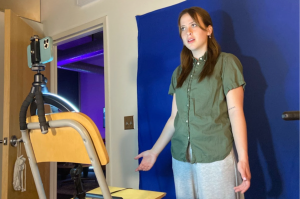
Huddling together for warmth in the 40-degree weather while also trying to stand under the crowd’s sparse umbrellas—acting as the only shelter from the early morning rainstorm—swarms of people unloaded from school buses April 6 and overtook Parking Lot B at U.S. Cellular Field.
With opening day for the White Sox two days away, the field and its lots were empty except for several hundred energetic Chicago charter school students, parents and advocates. They met at 7 a.m. for a rally with Illinois Network of Charter Schools before travelling to Springfield to lobby legislators to break the state budget stalemate.
Carol Coker stood in the crowd front and center, cheering over the other parents and kids. Wearing her “I *heart* My Charter School” T-shirt under her parka, she hoisted her handmade “My Child, My Choice” poster above her head as each speaker took the stage under pummeling rain.
Coker has two honor-student daughters—a high school junior and a seventh grader at Catalyst Maria Charter School. She said she pulled her children out of a traditional school a few years ago to get them the specialized attention they deserved.
The current state of Chicago Public Schools due to its hostile relationship with the Chicago Teachers’ Union, whose teachers do not work in the charter system, is one of contractual issues as well as accusations of financial misuse and unfair practices.
Her daughters do not need to be victims or pawns in this struggle, Coker says, calling her decision one that brings stability.
“[Other] CPS schools have a lot of strikes and charters just don’t have that,” Coker said. “When my daughter graduates eighth grade, she will continue on to a charter school.”
This rally occurred days after the April 1 CTU strike, in which most city school sessions were cancelled. Coker’s daughters, however, suffered no interruption in their school day.
As the political climate between the union and CPS worsens, more parents could be weighing the decision to send children to one of Chicago’s 131 charter schools. For those who already do, their choice is confirmed by the turmoil.
Kiola Millan sent her 14-year-old son to UIC College Preparatory High School this year after he asked to be challenged more academically. As a parent to one of Chicago’s 60,000 charter students, she has been happy with her decision ever since. For her, it’s closer to the house; for him, the programs are exactly what he asked for.
“It’s always best to keep the kids in class,” Millan said. “I get the [CTU] teachers have to make their point, but it’s not fair to the kids.”
Carlos Perez, president of Chicago’s Charter Parents United, said the bad news for CPS parents reaffirms the decisions of charter school parents who already have students enrolled.
“Families are saying, ‘we’re glad in our school we don’t have to focus on politics, we can focus on teaching and learning in our building,’” Perez said.
Charters often have a goal of creating a more flexible cohesive school culture for families, according to Sean Gill, a research analyst at the Center on Reinventing Public Education, an organization at the University of Washington that studies different options for K-12 education.
“The district has tried ways to [create] autonomy in CPS, but it’s certainly a harder task with the district infrastructure the school has to operate in,” Gill said. “Whether they are trying to make things more flexible for parents, it’s probably a lot harder for them.”
Though schools weren’t closed, some union charter teachers showed support by marching in solidarity with CTU during the rally.
Brian Harris, president of the Chicago Alliance of Charter Teachers and Staff, explained that charter teachers, despite their own budget issues, cannot strike due to a no-strike clause in their contracts.
But parents who see it as a more viable option because of that clause may be mistaken.
“[Charters] don’t do any better, by and large, than regular public schools do,” said Harris, who teaches at CICS Northtown Academy. “[They] have good marketing techniques public schools don’t use, and have a much better image than they probably deserve. A lot of people are taken in by that.”
In the midst of the recent strike, Illinois Network of Charter Schools sent an April 1 press release highlighting the fact that charter students were in school learning while CTU was striking.
Melissa Sanchez, associate editor of Catalyst Chicago, which covers urban schools, said this is charters “capitalizing” on the situation to promote the schools, though it may have no effect at all.
While charter enrollment has increased annually, it is uncertain if the bad union climate will cause increases next year, Sanchez said. She added, however, that arguments could be made that this is something parents will look at after the recent off days.
“A lot of them have longer school days and years,” Sanchez said of why parents choose charter schools. “These strikes cut into the length of the school year. You could make that argument: some families may see things like the strike and opt to put their kids elsewhere, [but] I don’t know if most families really understand the differences between the unions.”












Be First to Comment